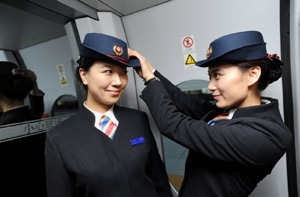
BEIJING - Washington's decision not to name China as a currency manipulator is expected to reduce Sino-US trade frictions triggered by the exchange-rate issue, said analysts.
A two-directional value for the currency is likely to replace the previous one-way (rising) traffic in the coming months, indicating an increase in the influence of the market in response to the US chiding China for slowing reform of the exchange rate, they said.
According to a semi-annual report released by the US Treasury released to the Congress on Tuesday, the Obama administration didn't designate China as currency manipulator. However, the report repeated US complaints that the appreciation of the yuan was "insufficient".
Earlier this year, President Barack Obama came under pressure from the Senate to impose levies on imports from China, the second-largest trading partner of the US, if the country refuses to adopt market-based exchange rates.
The Treasury statement was based on the realities of the international economy rather than political rhetoric, and the US may expect more cooperation with the world's second-largest economy next year amid the risk of global recession, said Wang Haifeng, director of the International Cooperation Center affiliated with the National Development and Reform Commission.
"Sino-US trade frictions, sparked by the exchange-rate issue, may not rise in the short term. That will benefit both countries," Wang said.
John Ross, who used to work as director of economic and business policy for Ken Livingstone, the former mayor of London, said on Tuesday that "if the Obama administration does not cooperate with China, the negative economic consequences will be felt in the US itself".
The US trade deficit with China is not a result of China's exchange-rate policies, but of its persistently high fiscal expenditure, according to Ross.
"China engaging in rapid yuan appreciation would not solve the problem, but it would sharply slow the growth of China's economy, which is not desirable for the world economy," Ross added.
On Wednesday, the yuan appreciated to 6.3146 a dollar, the strongest level since China unified its official and market exchange rates at the end of 1993. It has risen approximately 4 percent against the dollar this year.
Hong Lei, a foreign ministry spokesman, told a news conference that the country will continue to allow a broader band for the exchange rate of the yuan and improve reforms related to a basket of different currencies and to float the rate according to market demand.
The exchange-rate issue may be raised again as a political ploy during next year's presidential elections, which may prompt the Chinese authorities to take measures to protect exports, said Jiang Changjian, a professor with the International Relations and Public Affairs Department of the Shanghai-based Fudan University.
A report from Standard Chartered Bank PLC predicted that the Chinese currency is likely to appreciate at a pace of 3.3 percent next year, a slower rate than in 2011.
China Daily
 Lights on cars and models in Guangzhou
Lights on cars and models in Guangzhou
 Solar greenhouse boosts modern agriculture
Solar greenhouse boosts modern agriculture
 Crew ready for Harbin-Dalian high-speed rail
Crew ready for Harbin-Dalian high-speed rail
 Ginger vendor pursues dream of writing
Ginger vendor pursues dream of writing
 Models shine at Guangzhou auto show
Models shine at Guangzhou auto show
 Auto show arrives at Guangzhou
Auto show arrives at Guangzhou
 A Dongfeng Nissan car at the Guangzhou Auto Show 2012
A Dongfeng Nissan car at the Guangzhou Auto Show 2012
 College graduate becomes farmer
College graduate becomes farmer